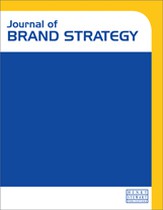No brand can easily claim to be ‘luxury’: A case study of Hugo Boss’ brand positioning (2006–2020)
Abstract
Much confusion still prevails over the distinction between the terms luxury, premium and fashion. Both academics and professionals understand them very differently. This paper delves into the relationship between positioning and business model using the framework proposed by Kapferer [Kapferer, J. N., (2016), ‘The Challenges of Luxury Branding. The Routledge Companion to Contemporary Brand Management’, Routledge, London, p. 485], which highlights how different the business models from luxury, premium and fashion are. Another trading-up brand strategies framework is presented, and a new trading-up strategy model is then proposed. To illustrate these theoretical frameworks and related strategies, the German clothing icon Hugo Boss has been chosen as a case study for its self-proclaimed positioning’s shift, over fifteen years (2006–2020), from premium to luxury and back to premium. In terms of methodology, a longitudinal study has been favoured to observe Hugo Boss’ changes of positioning over time. This paper relies on secondary data, drawn from Hugo Boss’ annual reports of the aforementioned time period, its investors’ presentations, bank analyst’s reports and business newspapers’ articles. Along three self-elaborated drivers of a trading-up strategy from premium to luxury (ie develop exclusive distribution, increase product quality and fuel marketing engine), the findings about Hugo Boss have shown that the brand only partially developed its business model along these lines, resulting in a shift, in 2016, towards a trading-down strategy back to its original positioning in premium. However, in the years until 2020, these trading-up investments have had long-lasting and significant effects on the brand performance. Additionally, further results indicated that the shareholder structure, the choice of management, the brand’s communication and the macroeconomic environment were decisive factors as well.
The full article is available to subscribers to the journal.
Author's Biography
Marc Paternot holds a PhD in Marketing from the Johannes Gutenberg-University of Mainz (Germany) and an MBA from HEC Paris. He teaches at various business schools in France and Germany (ESCP, Neoma, Hochschule Fresenius Cologne and International School of Management Dortmund). Prior to embracing the academic path, Marc held various marketing and sales managerial positions in international fast-moving consumer goods and luxury companies in Europe.
